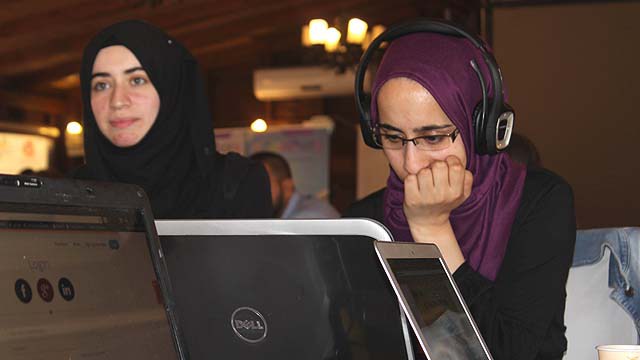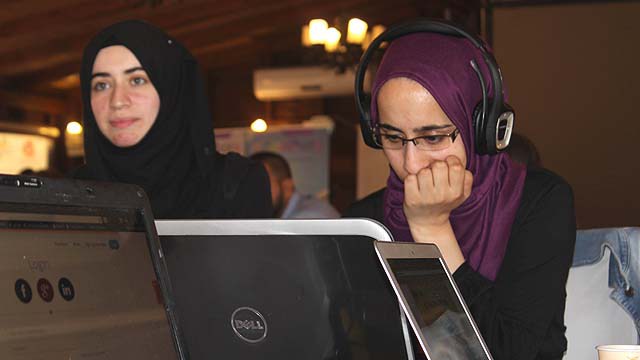The gruesome Facebook video of an 18-year-old, mentally disabled white male being savagely beaten by four African Americans has thrust the issue of race right back into the national spotlight. During the Facebook Live torture, one of the alleged assailants can be heard yelling, “f*ck white people.”
While every society grapples with the scourge of racism, Americans can take some solace in the fact that there is an effective way to fight discrimination. Just check out how Israel is managing to integrate a large, once overwhelmingly hostile minority: the Arabs.
Similar to minority groups in the United States, Arabs have by and large been separated from the wider society in four fundamental ways: where they live; where they go to school; primary sources of information and political ideals. So, even though Jews and Arabs are afforded equal rights under Israeli law, the two sectors live in separate societies.
However, studies are showing that Israeli Arabs are choosing integration over seclusion. Despite ongoing regional tensions, several findings show that the vast majority of Arabs living in Israel, including Judea and Samaria, would much rather live under Israeli administration than under the Palestinian Authority (PA).
Tellingly, a recent survey conducted by the Israel Democracy Institute found that 60% of Arab Israelis described their personal situation as ‘good’ or ‘very good’ in Israel, while 55% even said they were ‘proud citizens’ of the State of Israel.
Beyond such abstract concepts as social justice and equal opportunity, there is a practical consideration for the Israeli government making every effort to integrate the large Arab minority.
The country’s economic growth is dependent on enabling as many citizens as possible to buy the goods and services that Israeli is producing. The Arab population constitutes approximately 20% of the population, while only contributing 8% of the GNP. Growth in the Arab sector will thus grow the GDP, reduce poverty and increase employment.
As such, the incoming Trump administration should consider passing and implementing a pro-growth plan to develop minority communities in an effort to bring them up to par with the general population. Unlike Federal entitlement programs that enshrine multi-generational poverty, crime and unemployment, this proposal can take a page from the Israeli government, which in 2015 approved a groundbreaking NIS 15 billion ($3.84 billion) five-year plan to “advance a systematic and structural economic development plan for the minority sector.”

Highlights of the plan include strengthening law enforcement in minority neighborhoods; providing widespread investment in education in the Arab sector; subsidizing public transport in minority communities and allocating funds to the development of industrial areas in Arab municipalities.
Fiscally conservative Americans take note: The plan does not call for any new taxes since most of the money comes from changes in the allocation of funds to different government ministries. In other words, the ministers are the ones paying for the plan with their ministries’ budgets.
In Israel as in the United States, alienation and real or perceived discrimination are tickets to mean, short, unproductive and unhappy lives. However, by providing hope to minority groups, both countries can help unleash a vast human potential for performance, profit and – most importantly – lives being lived with dignity.
While extremist voices sometimes make it appear that America is headed toward a full blown race war, the Israeli experience shows that though there is no cure for the cancer of racism, there are practical ways to narrow economic gaps, expand opportunity and increase the integration of historically disadvantaged population groups.
Back to Facebook: A friend of mine in Israel recently posted a vignette about sitting down to have breakfast and seeing an Arab family walk by with a beautiful sleeping baby girl in tow. All the patrons at the restaurant, the vast majority of who were most assuredly Jewish, cooed over the ‘oblivious princess’. At some point, a Jewish grandma approaches the Arab Israeli family and asks to hold the sleeping girl. After gently rocking the baby and dispensing with effusive praise, this slice of daily life ends with the imparting of unsolicited parenting advice from the elderly Jewish woman to the young Arab couple.
In Israel and the United States, hope for national solidarity springs eternal…
This piece first appeared in www.newsmax.com.

Regarding Israeli Arabs, I still think the better part of wisdom is, l’kaved u’l’chasheid, respect and/but suspect…
LikeLike
Or, as U.S. President Ronald Reagan said: “Trust…but verify.” Cheers, Gidon.
LikeLike
Do we ever consider that the world is failing in the teaching of ethics and values, the prevention of crime, violence against women and children, drug and alcohol abuse, HIV and sexually transmitted diseases etc. because our current educational programs are boring and outdated? Do we URGENTLY require think tanks of the best holistic educators to provide the most intuitive and interactive educational TOOLS for both formal and informal education?
These have been called for as far back as the World HIV/Aids Conferences of 2008 and 2010.
Israel is a world leader in medical, scientific and agricultural research etc. Let Israel be the leader in teaching ethics and values, and in fact any worthwhile subject, to make the world a better place and change current behavioural patterns . As a Jew living in South Africa, I hereby offer GIMME 5, available in the physical and android digital formats to help educators, peer educators, madrichim, youth leaders, camp counsellors, etc. in their work.
GIMME 5 not only benefits those learning, but also those teaching, making them more dynamic and intuitive, but allowing them to incorporate ideas of their own and previous successful projects within the GIMME 5 educational modules and school curricula.
LikeLike
In order to combat racism and zenophobia we have to EDUCATE holistically and intuitively. Gimme 5 is the TOOL that we can use to achieve that aim. I have explained how in my previous article.
LikeLike